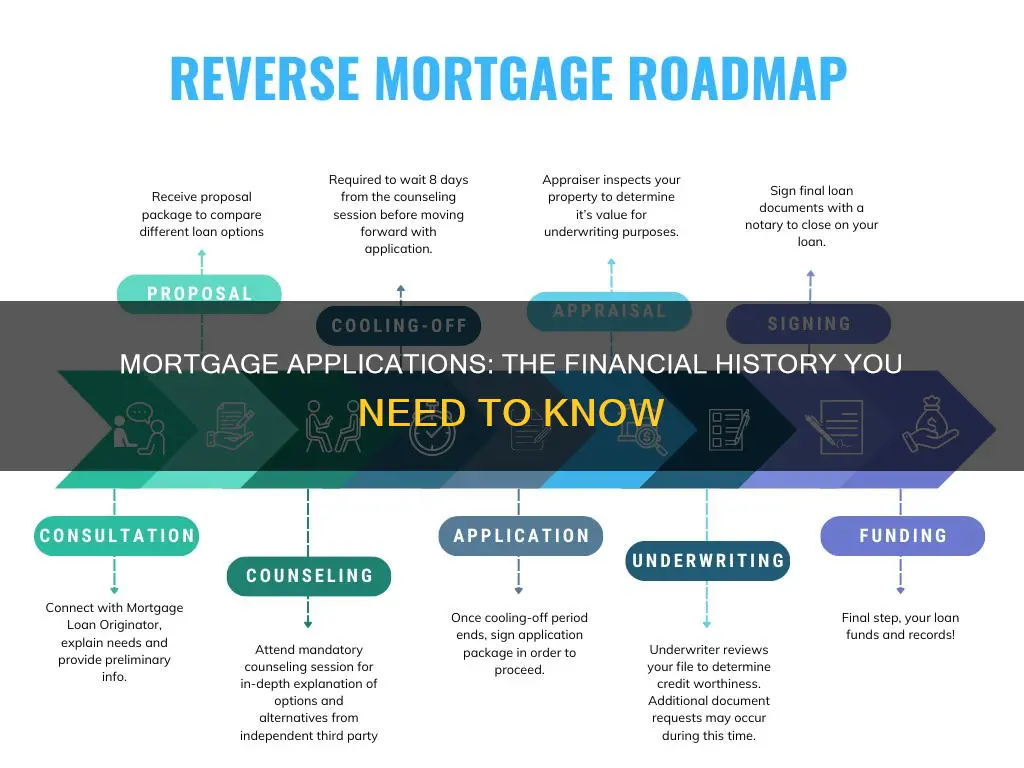
When applying for a mortgage, lenders will look at your credit history to determine if you're a responsible borrower and if you're likely to make your monthly payments on time. While credit history is an important consideration, it is not the only factor that lenders will look at. Lenders will also assess your salary, other sources of income, existing debts, living costs, and any dependents. In terms of how far back lenders will look, most will focus on recent credit activity, typically the last two to three years, as this is generally seen as the most accurate indication of your current financial situation. However, some lenders may look back as far as six or seven years to gain a more complete picture of your financial patterns.
| Characteristics | Values |
|---|---|
| How far back do mortgage lenders typically look? | 2-3 years |
| 6 years | |
| 7 years | |
| 10 years | |
| What do they look at? | Credit history |
| Salary and other sources of income | |
| Existing debts | |
| Living costs | |
| Dependents | |
| Bank statements | |
| Payslips or tax returns | |
| Savings | |
| Regular income | |
| Expenditure | |
| Unusual activity in accounts | |
| Property type | |
| Deposit amount and source |
What You'll Learn

How far back do mortgage lenders check credit history?
When applying for a mortgage, your credit history is a crucial factor in the lender's decision-making process. Lenders will carefully review your credit history to assess your credit behaviour, including your payment history, credit utilisation, and any outstanding debts or defaults. A lengthy credit history is preferred by mortgage lenders, as it allows them to gauge your financial responsibility and determine your creditworthiness.
The standard look-back period for credit reports may vary among lenders, but generally, they will examine your entire credit history, including both recent and older credit-related information. Negative information, such as missed payments, holds particular significance as lenders view these as potential indicators of financial risk. According to the Office of the Australian Information Commissioner, most negative information will remain on credit reports for up to 5 years or 7 years.
In the UK, adverse credit events typically remain on your record for up to 6 years. If the credit issue is severe, such as bankruptcy, it may take additional time to rebuild your credit score. To improve your credit score, you can practise careful money management, borrow sensibly, make timely repayments, and settle debts. It is also recommended to maintain a low debt-to-credit ratio and not exceed 50% of your maximum available credit.
While maintaining a positive credit history is essential, it is not the only factor considered by mortgage lenders. They will also look at other aspects of your financial situation, such as your income, employment history, and ability to make timely repayments. Therefore, even if you have some negative items on your credit report, it does not automatically disqualify you from obtaining a mortgage. Lenders will consider the overall picture of your financial health and make a decision based on their specific criteria. Additionally, multiple credit checks from mortgage lenders within a 45-day window are recorded as a single inquiry, so you can shop around for the best terms without negatively impacting your credit score. It is also important to regularly check your credit report for errors and have them corrected to ensure an accurate representation of your creditworthiness.
Rental Property Income: New Mortgage Game-Changer?
You may want to see also

What do mortgage lenders look for in bank statements?
When applying for a mortgage, lenders will typically ask for two months' worth of bank statements, or the last 60 days' worth of statements. This is to ensure that the funds are available for the mortgage. Lenders use bank statements to assess a borrower's financial health and credibility when considering a loan application. They are looking for clues about the borrower's financial health, their income, their spending habits, and whether they can handle a mortgage.
Lenders will look for four key things on your bank statements:
- Income verification: Lenders will check for regular deposits, paychecks, or other sources of income to ensure that the borrower has a steady income to repay the loan. They want to see financial consistency and responsible money management.
- Expense analysis: They examine the borrower's spending habits and recurring expenses to gauge their ability to manage money responsibly. This includes looking for consistent bill payments, existing debts, and overall financial commitments.
- Source of funds: Lenders will want to see that all the funds in your accounts have been "sourced and seasoned." This means that the source of each deposit is acceptable and verified, and the funds have been in the account long enough (typically 60 days, but sometimes up to 90 days) to show they weren't a last-minute loan or a questionable deposit.
- Cash reserves: Lenders will want to see that you have enough cash flow or savings to make the monthly mortgage payments and cover any emergency costs.
Lenders will also be looking for any red flags that might indicate financial trouble, such as a high debt-to-income ratio or undisclosed debt payments that aren't on your credit report. They will also want to ensure that any large deposits are legitimate and not borrowed money.
The Yield Curve: Mortgage Rates and Impact
You may want to see also

How does credit history affect mortgage rates?
Credit scores play a significant role in determining mortgage rates. The higher an individual's credit score, the lower the mortgage rate they will be offered, resulting in lower monthly payments. Conversely, a lower credit score indicates higher risk to lenders, leading to higher interest rates and more expensive monthly payments.
An individual's credit score reflects their credit usage history, including their payment and debt management habits. Lenders use this information to assess the likelihood of the borrower meeting their obligations. A strong history of timely payments contributes to a higher credit score, which reassures lenders and results in more favourable mortgage terms.
Maintaining a good credit score is crucial for obtaining the best mortgage rates. Paying bills on time, keeping credit accounts open to demonstrate a longer credit history, and avoiding new debt obligations are recommended strategies to achieve this. Additionally, it is advisable to settle any late bills or accounts in collections, as these can negatively impact an individual's credit score.
The specific calculation of credit scores remains somewhat mysterious, but it is known that a mix of revolving and instalment debt, such as mortgages, positively influences the score. Credit scores typically range from 300 to 850, and a score of 740 or higher is generally considered favourable for securing the best mortgage rates.
While credit scores are essential, lenders also consider other factors when determining mortgage interest rates. These factors include the type of loan, repayment term, down payment amount, and whether the property will be the borrower's primary residence. It is recommended to consult with a trusted loan expert or credit counsellor to explore the options available based on one's financial situation.
The Best Time to Apply for a Mortgage
You may want to see also

What is the impact of adverse credit history on mortgage applications?
Adverse credit history can have a significant impact on an individual's ability to secure a mortgage. Adverse credit, or 'bad credit', refers to a history of financial difficulties, including missed payments, delinquent debt, defaults, and other forms of negative marks on a credit report. These marks lower an individual's credit score and make it more difficult to obtain a loan or credit with favourable terms.
When assessing a mortgage application, lenders typically look at the applicant's credit history over the past six years. Any adverse information, such as missed payments or bankruptcies, will be considered in the application process. While some lenders may focus primarily on recent credit activity, others may inquire about any past instances of bad credit. Therefore, adverse credit history, particularly if it is recent, can lead to higher rejection rates from mainstream lenders.
The impact of adverse credit history on mortgage applications is profound, and consumers with adverse credit often face higher rejection rates. This can result in feelings of discrimination and frustration, with 51% of those with adverse credit feeling discriminated against by lenders. The low confidence among individuals with adverse credit further exacerbates the challenge of securing a mortgage. Only 5% of customers with adverse credit feel completely confident in their mortgage prospects, compared to 24% of the general population.
However, it is important to note that credit history is not the sole factor considered by lenders. Other factors, such as salary, sources of income, existing debts, living costs, and dependents, are also assessed to ensure the borrower can manage the debt. Additionally, the type of property and the amount of deposit saved can influence the terms of the mortgage. Seeking guidance from a mortgage broker can be beneficial, as they can help individuals with adverse credit find specialised lenders who are more willing to consider applicants with complex credit histories.
Understanding TD Mortgage Escrow Changes and Notifications
You may want to see also

How can mortgage brokers help with bad credit?
Having bad credit does not always mean you cannot get a mortgage. Mortgage brokers can help you find a mortgage that supports your long-term goals. They have the knowledge, experience, and contacts to improve your chances of finding a mortgage deal. They can also help you optimise your application to give you the best chance of success.
Mortgage brokers have comprehensive access to the market and can source mortgage offers from niche lenders with more flexible eligibility criteria than traditional banks. They understand what these specialist lenders are looking for and can match their products to your needs.
Mortgage lenders' requirements for borrowers vary, but if you have bad credit, you should look for lenders that are willing to consider alternative credit data. This means they will review aspects of your financial situation, like on-time rent and utility payments, that aren’t normally reported to credit bureaus. You will need to provide the lender with documentation of this information.
You may also be able to qualify for a mortgage with a credit score as low as 500. However, you might have to make a larger down payment and pay a higher interest rate. A higher credit score can help you secure a better interest rate, which can save you thousands of dollars.
A non-qualified mortgage (or non-QM loan) does not conform to income and credit requirements. Non-QM loans can help people with poor credit, unusual income streams, or a bankruptcy in their past get a mortgage, but the interest rates are significantly higher.
Before approaching a lender for a loan, it is recommended that you finish paying off your debts to improve your credit profile and give you access to better deals. If this is not possible, mortgage brokers can still help you find a suitable option.
Usaa's Response to Poor Mortgage Reviews: What to Know
You may want to see also
Frequently asked questions
Mortgage lenders typically look at the last six years of credit history. However, some may only look at the last two to four years, while others may go as far back as seven years.
Lenders will look at your credit score to gauge how well you have managed your finances in the past and whether you are likely to make your monthly payments on time. They will also look at your bank statements and payslips or tax returns to assess your income, existing debts, living costs, and any dependents.
Even with bad credit history, you may be able to find a lender with criteria you meet. A mortgage broker can help you find the right lender for your situation. Additionally, an extra 6-12 months of good money management can improve your chances of getting approved for a mortgage.







